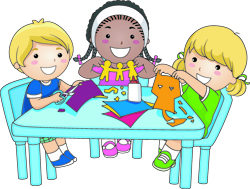Montessori Preschools: Preschool vs. Montessori

Montessori preschool programs are basically synonymous with the Montessori Casa program. Montessori Casa comes from Maria Montessori’s own description of her early childhood program as “the children’s house,” or “the casa dei bambini.” Montessori Casa refers to the fact that all aspects of the Montessori preschool environment are created specifically for preschool aged children. Children learn together, living and working cooperatively. Where homes and indeed most of our places are designed for adults, and in fact many classrooms are designed for the teacher, Montessori Casa creates an environment specifically for children that facilitates the education of young, precocious, curious minds.
Montessori preschool programs guide your child to learn at his or her own pace. Children are able to learn social skills, daily living skills, math, language, science, physical education and all other traditional courses of learning. Children will mix with others of different ages, benefiting all the children in the preschool. Instructors will guide all the children. Most or all of the Montessori schools listed on the OurKids website have educators trained in the Montessori method and philosophy. Montessori is hugely influential on early childhood instruction but is no longer the only type of school that focuses on early childhood education.
Many parents thinking about preschool need to consider the advantages of choosing to send their child to Montessori school instead. Montessori is a popular choice among parents for their child’s early years, and it’s important to know the advantages of Montessori over preschools. Preschools offer daycare that may be — in some cases, such as private school — focused on early childhood education. These are structured learning environments for children before they begin Kindergarten. Montessori is an entirely distinct alternative complete with its own learning style, methods and philosophy.
Both offer excellent options for our young learners. Examine both to determine the best fit for your preschool-aged child. Most provinces offer full day or half day learning for young children across Canada, but there are distinct advantages to trying preschool in a private school.
Early Childhood Education at private schools:
• Programs focus on learning
• Offer children a head-start on their education
• Gives children taste of what school will be like
• Some have funding available for parents
• Sometimes ECE tuition may be eligible for tax credits
Read more about early childhood education.
Montessori schools
• While a popular choice for pre-school, Montessori is for children from infancy to 18 years (depending on school)
• Versus public and private schools, Montessori offers a child-centred learning environment (where the teacher is the center of the classroom in any other environment).
• Teachers don’t lecture, but guide in Montessori. They assist students with discovering their true potential through challenging experiences to be completed uninterrupted in a learning environment
• Student directed learning is emphasized vs. learning based on a prescribed curriculum
• Montessori promotes a hands-on approach to learning versus a focus on seatwork.
• They aim to develop all aspects of child’s psyche – emotional, spiritual and intellectual – to develop well-rounded individuals.
Montessori Casa versus preschool
Many parents choose to send their children to Montessori for preschool years, as an introduction to the private school system or even versus traditional (and equally costly) daycare.
Montessori preschool programs are synonymous with the Montessori Casa program, where all aspects of the environment were created specifically for preschool age children to facilitate the education of young, curious minds. As opposed to the way school classrooms are centered around teachers, Montessori classrooms are centered around children.
In Montessori Casa:
• Each child learns at his or her own pace
• Children learn social skills, daily living skills, math, language phys-ed, and other traditional courses
• Children interact with others of different ages, creating an environment where younger students can learn from the older children, and older children have the opportunity to take the lead
• Students are guided by Montessori instructors who are trained in the Montessori philosophy.




